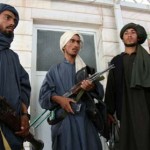The thinking on Afghanistan is changing. Russia appears to have held talks with the Afghan Taliban and has conducted joint military exercises with Pakistan. Moscow has also hosted discussions on Afghanistan with China and Pakistan and has indicated a willingness to be flexible towards the Afghan Taliban. This represents a major volte face by Moscow as it was only a little over a quarter of a century ago, in 1989, that it faced a humiliating retreat across the Amu Darya River. This is a change born of nimble strategic thinking, the kind that saw Russia intervene in Syria in 2015 with such marked results. What has driven this change of course?
Russia, which has been irritated by India slipping into the American sphere of influence, is likely to also welcome a stake in the China Pakistan Economic Corridor (CPEC). But the reason it gives for the change of policy is the Islamic State (IS). The IS in Afghanistan is relatively weak, but, as the group comes under increasing pressure in Syria and Iraq, Afghanistan could become a future safe haven, from where it could pose a threat to Russia’s own Muslim population via the Central Asian Republics. The policy change could also make Russia a serious power in South West Asia for the first time since 1989.
Russia has been impressed by Taliban resistance to the IS and must also doubt whether the old Northern Alliance–once the partner of choice of Iran, India and Russia– could ever be resurrected as the shield against Islamist extremism that it was in the 1990s under its late military leader, Ahmed Shah Masood.
Iran too has reopened links with the Taliban, although not for the first time since the Taliban massacred its diplomats in Mazar-i-Sharif in 1998. The main cause for concern for Iran as well is the Sunni sectarian IS.
China, for its part, has never had much cause to worry about the Taliban. It is preoccupied more with the Uighur Islamists who could return to Xinjiang province from training or jihad in Afghanistan. However, Beijing has been happy to outsource the monitoring of Uighurs to Pakistan’s formidable intelligence services.
Zamir Kabulov, the veteran Russian expert on Afghanistan, was correct when he drew a distinction (at the recent ‘Heart of Asia’ conference in Amritsar[1]) between the Afghan Taliban, whose ambitions lie only within Afghanistan, and the IS, who are global jihadists. NATO had some justification in fighting the Taliban because they had hosted Osama Bin Laden; and a Taliban victory in southern Afghanistan would have provided the al-Qaeda with an escape route from the tribal areas on the Pakistan border. Yet Western efforts to assist reconciliation between the Taliban and the Kabul government implicitly recognised that the Afghan Taliban (unlike the Pakistan Taliban or TTP) are not international terrorists, but Pashtun insurgents with purely national aspirations.
Kabulov is also pragmatic in identifying Pakistan as a key ally. He personally experienced the role which Pakistan played in undermining the Soviet occupation of Afghanistan and then watched as Pakistan played the same role against the Karzai government and its NATO allies[2]. Pakistani policy towards Afghanistan has an enduring quality, an extension of the British colonial ‘Forward Policy’ which required Afghanistan to have a government willing to confound the ambitions of enemies. The British worried about the Russians (and later the Germans) whereas Pakistan fears Indian influence in Kabul, and may now fear the IS.
There are some senior officers in the Pakistan army who at last understand that Islamist extremism represents a bigger threat than India to Pakistan’s survival. For Rawalpindi (where Pakistan’s Afghan policy is decided at army headquarters), a government in Kabul with significant Taliban participation will provide assurance on both counts while also hedging against aspirations of a Greater Pashtunistan. On this last point, I consider Pakistan to be mistaken[3].
Pakistan will, of course, be jubilant at Moscow’s change of policy. Rawalpindi’s high-risk policy of supporting the Afghan Taliban continuously since 1994 is now beginning to receive some international approval. It is also galling to India which has invested in both the Karzai and Ghani governments.
The United States, which still has 9,000 troops in Afghanistan, will also have cause for concern; it is holding the fort with an Afghan army which has taken heavy losses in 2015 and 2016. With dissension in the Afghan leadership and corruption as destructive as ever, the Ghani government hangs perilously on the decisions of the incoming U.S. President Donald Trump.
Much will hinge on Trump’s ability and willingness to reach pragmatic agreements with Prime Minister Putin on subjects such as Syria and Afghanistan. The controversy over alleged Russian interference in the U.S. electoral process will not help such efforts. But neither New Delhi nor Washington will wish to find themselves isolated while the Taliban receives wider endorsement. A negotiated settlement to Afghanistan could be achieved if Washington and New Delhi join Moscow, Beijing, Islamabad and Tehran in a joint effort. It will be a lot more difficult later as the Afghan government’s grip on power continues to weaken and its negotiating leverage diminishes.
Tim Willasey-Wilsey is Senior Visiting Research Fellow at King’s College London, a former British Diplomat and a member of the Chatham House Council.
This article was exclusively written for Gateway House: Indian Council on Global Relations. You can read more exclusive content here.
For interview requests with the author, or for permission to republish, please contact outreach@gatewayhouse.in.
© Copyright 2016 Gateway House: Indian Council on Global Relations. All rights reserved. Any unauthorized copying or reproduction is strictly prohibited
References
[1] For reporting on the Heart of Asia Conference in Amritsar, see http://hoa.gov.af/
[2] Gall, Carlota, The wrong enemy, American in Afghanistan 2001-2014 (New York: Houghton, Mifflin, Harcourt, 2014)
[3] For the ‘Forward Policy’ and Pashtunistan see Willasey-Wilsey, Tim, ‘The return of the Pashtun problem and NATO withdrawal from Afghanistan in 2014’, Gateway House, 18 June 2012, https://www.gatewayhouse.in/return-pashtun-problem-and-nato-withdrawal-afghanistan-2014/ (Accessed on 4 January, 2017)


